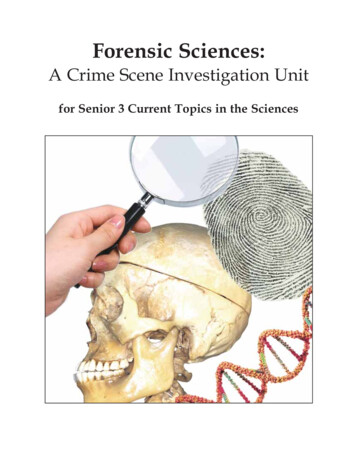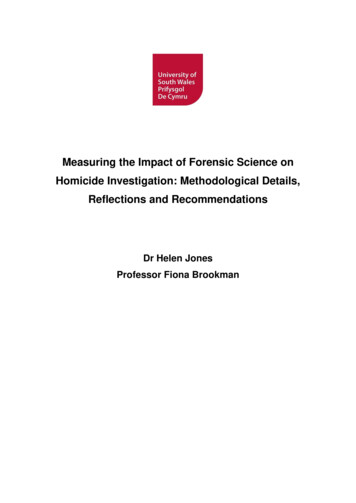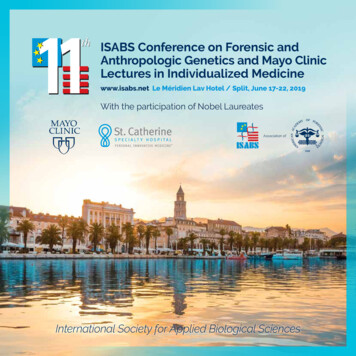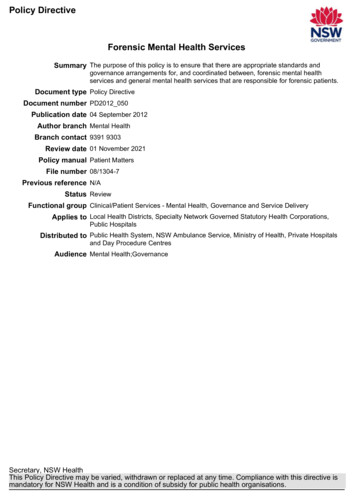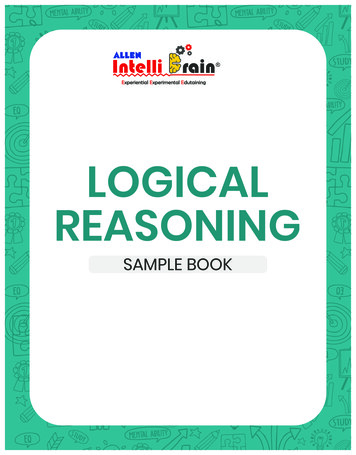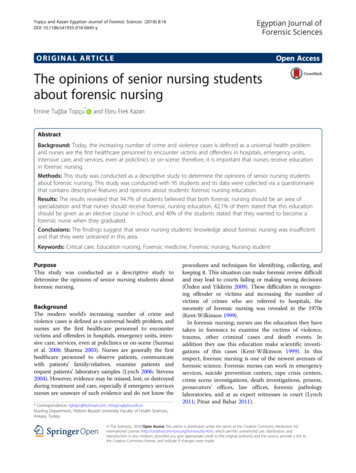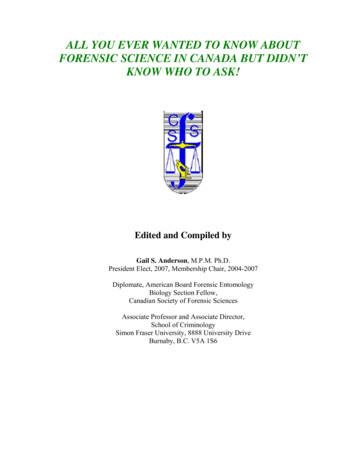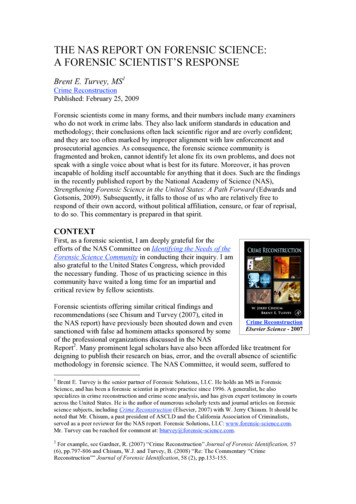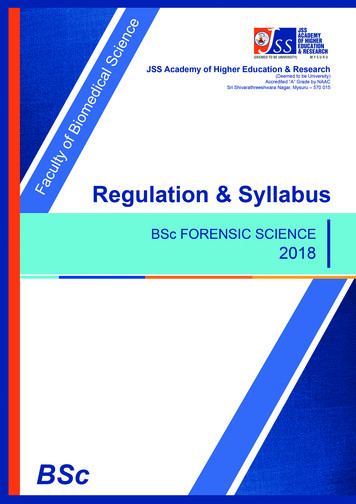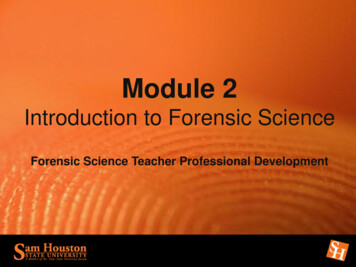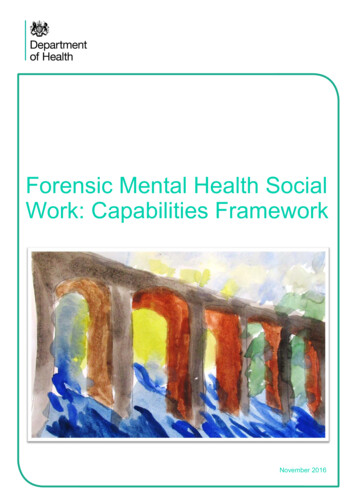
Transcription
Forensic Mental Health SocialWork: Capabilities FrameworkNovember 2016
DH ID boxTitle: Forensic Mental Health Social Work: Capabilities FrameworkAuthors:Daisy BoggClaire BarchamWith –David Cochrane, West London Mental Health NHS Trust and Ealing Council.Lynne Corcoran, Nottinghamshire Healthcare NHS Foundation Trust.Robert McLean, Mersey care NHS Foundation Trust.Art work produced by the Supported Craft Group at Rampton Hospital.Document Purpose: Best Practice GuidancePublication date: November 2016Target audience:Forensic Mental Health Social Workers and their Line Managers, Senior Managers in Councils employing ForensicMental Health Social Workers, Senior Managers in Provider Forensic Mental Health and Learning Disabilityorganisations, Commissioners of Secure Mental Health and Learning Disability Services , Commissioners ofCommunity Forensic Mental Health and Learning Disability Services , Social Work academics delivering MentalHealth and Learning Disability and Safeguarding training courses, Senior Managers in National Probation Service.Contact details:Office for the Chief Social Worker for AdultsCommunity CareDepartment of HealthRichmond House79 WhitehallSW1A 2NSYou may re-use the text of this document (not including logos or art work) free of charge in anyformat or medium, under the terms of the Open Government Licence. To view this licence, nt-licence/ Crown copyright 2016.Published to gov.uk, in PDF format only. www.gov.uk/dh2
Forensic Mental Health Social Work: Capabilities FrameworkContentsContents .3Table of Figures .4Acknowledgements .5Steering Group .6Supported by .7Foreword.8Executive summary .101.Introduction .12The Role of the Forensic Social Worker .12About the Framework .13Using the framework in practice .182.Forensic Mental Health Social Work Capability Framework .22Professionalism .22Values and Ethics .23Diversity .24Rights, Justice and Economic Wellbeing .25Knowledge .27Critical Reflection and Analysis .28Interventions and Skills .29Context and Organisations.31Professional Leadership .323.Knowledge and Skills Statement .34Key Roles and Functions .35Capability Statements: Knowledge and Skills at different levels. .39Appendix 1: Bibliography .43Appendix 2: Self-Assessment Tool .44Appendix 3: Capability Grids .48Appendix 4: High Secure Services Standards .75Appendix 5: Consultation Activities.923
Forensic Mental Health Social Work: Capabilities FrameworkTable of FiguresTable 1: Support Requirements at each level of capability . 16Table 2: Knowledge and skills at different levels . 39Table 3: Capability Grids . 48Table 4: National Standards for the provision of social work services in the high secure hospitals(updated January 2016) . 754
Forensic Mental Health Social Work: Capabilities FrameworkAcknowledgementsThanks are due to the many practitioners, managers and other stakeholders who have takenpart in the consultation and drafting processes involved in the development of this framework.Thanks also to the Supported Craft Group at Rampton Hospital for producing art work forinclusion in this document.5
Forensic Mental Health Social Work: Capabilities FrameworkSteering GroupDr Ruth Allen, British Association of Social WorkersBen Asare, The Priory GroupDawn Beaumont-Jewell, Carer RepresentativeDavid Cochrane, West London Mental Health NHS Trust and Ealing Council (Chair)Lynne Corcoran, Nottinghamshire Healthcare NHS Foundation Trust.Henderson Goring, Service User RepresentativeTeresa Henson, St Andrews HealthcareJoyce Kallevik, Women at WishMary McFeely, National Probation ServiceRobert McLean, Mersey care NHS Foundation Trust.Grace Nyandoro, The Priory GroupDavid Phillips, West London Mental Health NHS Trust and Ealing CouncilRichard Prior, Avon & Wiltshire NHS Foundation TrustProf Martin Webber, University of YorkEmma Weir, Leicestershire County Council6
Forensic Mental Health Social Work: Capabilities FrameworkSupported by7
Forensic Mental Health Social Work: Capabilities FrameworkForewordI am delighted to support the publication of this framework,which has been developed with Forensic Social Workers, theirmanagers, commissioners, multidisciplinary colleagues andmost importantly, the people and families whom they directlysupport. Forensic Social Work is a highly specialist area ofmental health work which demands both generic and morespecialist knowledge and skills. Forensic Social Workers workalongside a whole range of other professionals, often in ahealth professional-led context, and maintaining theirprofessional identity and perspective as Social Workers cansometimes be a challenge.Previous policy and capability work in relation to mental healthsocial work more generally has been well received by thesector. The ‘Role of the Social Worker in Adult Mental HealthServices’ paper (Allen, 20141), and more recently theDepartment of Health sponsored initiative ‘Social Work for Better Mental Health’ (Allen et al,20162) launched in January 2016, have set out the contribution which social work makes tomental health treatment and care. This new document continues to build on these resourcesand focuses on the forensic social work role and task, identifying not only the capabilities, butalso the knowledge and skills that a social worker in forensic mental health setting will need asthey progress through different career stages and continue to develop.Forensic social workers operate in a range of contexts, both in secure inpatient settings but alsowithin community teams supporting, and sometimes supervising individuals subject toConditional Discharge following Restriction Orders. While part 3 of the Mental Health Act 1983is the main legal framework under which individuals are treated, Forensic Social Workers needto have a well-developed knowledge and skill base to negotiate the various legal interfaces,considering complex issues such as risk and public protection, and balancing aspects of humanrights. Forensic Social Workers have to maintain their awareness of community care servicesand eligibility for social care support under the Care Act 2014 and Section 117 Mental HealthAct 1983.Within the consultation exercises which supported the development of this framework manycolleagues referred to the social work role as a ‘bridge’ between different settings and systems,and this type of role means that practitioners need to develop a comprehensive practice toolkit,1Allen, R (2014) The role of social work in adult mental health. Available at ers%202014.pdf2Allen et al (2016) Social Work for Better Mental Health: Resources and Strategic Statement. Available at work-for-better-mental-health/8
Forensic Mental Health Social Work: Capabilities Frameworkspanning a range of knowledge and skills, in order to provide the best possible social workservice within complex and challenging environments.Social Workers take on statutory duties in relation to Mental Health Tribunal reports and oftenare a resource for teams regarding Adult and Child Safeguarding issues. These situations mayinvolve complex judgements about mental capacity. Social workers not only support individualssubject to statutory intervention within treatment services, but they also work with families andoften take a lead on Multi Agency Public Protection Arrangements and on helping clinical teamskeep in mind victim issues, particularly in relation to developing realistic care pathways into thecommunity.Forensic Social Workers often have the opportunity to work with individuals and families over anextended period following serious violent or sexual offending, as a range of interventions helpsto improve symptoms, reduce risk and promote individual recovery. I know from manyconversations with Forensic Social Workers how rewarding this work can be.This document showcases the range of expertise within this specialist practice context. Itprovides a comprehensive career development framework which can be used to informcommissioning, service design and delivery, practice assessment and the development ofappropriate training to support practitioners to develop the capabilities required of the role.I am sure that this PCF will encourage wider awareness of this specialist area, and will assistthe development of enhanced professional skills and knowledge, and so support individualrecovery and public protection.Lyn Romeo.Chief Social Worker for Adults.Department of Health.9
Forensic Mental Health Social Work: Capabilities FrameworkExecutive summarySocial work is characterised by its ability to see the individual within thecontext of their family, their community and the wider society. Legalknowledge and an ability to understand how and when to intervene areboth necessary and appropriate in forensic settings. This makes socialwork an essential element in the care and rehabilitation of peoplesupported within those settings.What this means in practice is that forensic social workers understand and engage withindividual service users/patients, and also with their families and the communities from whichservice users have come. They support them through their journeys between different levels ofsecurity, and are knowledgeable about the community situations to which they will return. Likeother social workers, their understanding of human rights, and other legal frameworks, are keyto the support they offer. Professional isolation is a key concern for many forensic socialworkers, who are often located within health professional dominated environments. In thiscontext, it is vital that practitioners are able, and supported, to keep abreast of strategicchanges impacting on social work and community care services generally and maintain theirdistinctive professional voice within the context in which they are working.Forensic Social workers are involved in gatekeeping and ensuring that service users are beingmanaged at the least restrictive level of security. They act as core members of multi-disciplinaryteams working with detained patients who have committed serious sexual or violent offences,and they bring a social and family perspective to inpatient services.Forensic social workers lead on safeguarding children and adults and they maintain links withthe home areas to which most service users will eventually return. Social workers are involvedin writing mental health tribunal and other reports, and in care pathway planning, in order tominimise delays and ensure suitable community placements in line with Care Act (2014)requirements. Forensic social workers are involved in the community management of serviceusers, particularly those who are subject to conditional discharge or community treatmentorders.Their focus on the individual service user and also the wider system means that forensic socialworkers are able to understand and seek to balance the needs and rights of different people.This includes the patient who needs to understand their legal position, the victim who needs tofeel understood and protected, the family and friends who may struggle to understand what hashappened, and why. They are authentic and genuine when interacting with others,demonstrating empathy to engage different people in the work that they do, whilst maintainingprofessional boundaries.The work to develop capabilities for forensic social workers was commissioned by High SecureMental Health Commissioners, NHS England, and aims to refresh previous work on10
Forensic Mental Health Social Work: Capabilities Frameworkprofessional development within forensic social work, and set it within current best practicemodels.The process of consultation to develop this framework included social workers from across theforensic sector, providing an opportunity for them to articulate their role within the systems inwhich they work. This includes what can be expected of them at different points in theirprofessional development, and the unique contributions that they bring to the lives of serviceusers within the forensic system.The Role of the Forensic Social WorkerThe definition of forensic social work devised by the Central Council for Training and Educationin Social Work (CCETSW) during the 1990s remains relevant today and this framework seeksto build on this and the modern generic social work frameworks of the Professional CapabilitiesFramework (PCF) (TCSW, 2012) and the knowledge and skills statement (KSS) for adult socialworkers (DH, 2015).The Purpose of the Forensic Social Work Capability FrameworkThe forensic social work capabilities framework is designed to build upon these genericrequirements, which should be demonstrated by all social workers, rather than duplicate them.They set out a framework for post-qualifying progression and development for social workerspractising within forensic mental health settings.How the guidance can be usedThis guidance can be used in a number of ways.It is intended to be useful to commissioners, helping them to ensure that any social workprovision commissioned in the future is backed up by support for professional social workers.Organisations, both NHS and independent sector health providers, can use it as a way both tounderstand the contribution of social work, and to ensure social workers are supported tomaintain the social focus essential to their roles.It is also intended as a resource for individual social workers, their supervisors and managers,to help identify development needs and plan how to meet them. Education providers will alsofind it helpful in developing specialist modules for forensic social workers.11
Forensic Mental Health Social Work: Capabilities Framework1. IntroductionThe Professional Capabilities Framework (PCF) for Social Workers isthe generic framework which defines the standards expected of allprofessional social workers working at different levels throughout theircareers. The forensic social work capabilities framework is designed tobuild upon these generic requirements, rather than duplicate them. Thenew capabilities, set within the nine domains of the PCF, set out aframework for post-qualifying progression and development for socialworkers practising within forensic mental health settings.The PCF consists of nine domains and five post qualifying levels, progression through which ischaracterised by the ability to work with increasing risk, ambiguity and complexity withconfidence and autonomy. The level and domain descriptors provided by the PCF, combinedwith the wealth of legacy documentation previously applied to forensic mental health socialwork, were used during an extensive consultation process with a range of stakeholders to helpto think about and shape the standards and expectations of social work in both secure andcommunity forensic mental health service settings. (See Appendix 5 for details of the fullconsultation processes involved in the development of this framework. Full details of the PCFdomains, levels and capabilities can be found at - https://www.basw.co.uk/pcf/ )The Knowledge and Skills Statement (KSS), published by the Chief Social Worker for Adults(2015), is also applicable to the role of the Forensic Social Worker. The KSS requirements havebeen built into this framework, with the expectation that the standards required for a social workerat the end of their Assessed and Supported Year in Employment (ASYE) are common across alladult settings. Full details of the KSS can be found at ds/attachment data/file/411957/KSS.pdfThe Role of the Forensic Social WorkerIn 1995, the then regulatory body for Social Work Education – the Central Council for Educationand Training in Social Work (CCETSW) - published two documents: ‘Achieving Competence inForensic Social Work’ (1995a); and ‘Forensic Social Work: Competence and Workforce Data’(1995b). The former provided a working definition of the role of the forensic social worker:“Forensic social work is social work with mentally disordered people who present, or are subjectto, significant risk and as a consequence are, or could be, in contact with the criminal justicesystem The key purpose of forensic social work is to hold in balance the protection of thepublic and the promotion of the quality of life of individuals and by working in partnership withrelevant others to identify, assess and manage risk; identify and challenge discriminatorystructures and practices; engage effectively and identify, develop and implement strategies”(CCETSW, 1995a, p.12)12
Forensic Mental Health Social Work: Capabilities FrameworkSince this definition was developed, the social work profession has seen significant changes,including regulation and registration, development into a graduate level profession, and theidentification of explicit knowledge, skills and professional capability expectations. However,whilst the context of the role and the underpinning framework of social work as a profession haschanged over the last 20 years, this original definition of the purpose of the forensic social workrole remains as relevant today as it was at the time of its publication.The task and context of the forensic social worker may have changed, but the role itself remainsfocused on bringing a social perspective into the multi-disciplinary team, delivering socialinterventions and discharging statutory duties, including working with a wide range ofstakeholders and agencies to ensure that effective bridges are built between in-patientdetention and community discharge. This involves planning for and intervening in diverse issuessuch as responding to safeguarding concerns, application of the Mental Health Act 1983 andworking with families, victims and family victims, in liaison with Multi Agency Public ProtectionArrangements (MAPPA).About the FrameworkWithin the framework, each domain statement aims to capture the essence of the role offorensic social work in that area. Capability statements are provided in each area as examplesof how that domain might be seen in forensic social work practice, and the responsibilities andsupport requirements at different levels of practice are set out. Whilst relevant to other parts ofthe UK, this framework is based on the expectations and professional requirements for socialworkers in England and Wales.Within each domain area it is expected that practitioners will build upon their more genericsocial work capabilities, as set out in the PCF and the Knowledge and Skills Statement (KSS)for Adults, with the specialist requirements and standards for forensic mental health social work.Different services and settings have different requirements and functions, and as such ratherthan attempt to specify all the tasks that may be undertaken by a Forensic Social Worker, thisframework sets out how they would be expected to use their capabilities in the roles andfunctions they undertake. In other words, what is important is not simply the tasks the forensicsocial worker undertakes, but how they undertake them.The terms 'service user' and 'patient' are used interchangeably throughout this document. Thiswas a conscious choice due to the differences in opinion across the sector on what is theappropriate terminology to use in the forensic mental health service context.ScopeFor the purposes of this framework forensic social work is used to describe the tasks of socialworkers operating within settings where service users/patients subject to part 3 of the MentalHealth Act 1983 are treated and supported. Forensic inpatient services typically also havepatients who are detained under part 2 of the Act, for example on section 3, when a patient'srisk has escalated to the point that local services seek additional support. This includes services13
Forensic Mental Health Social Work: Capabilities Frameworkwithin the public, private, and voluntary sectors and encompasses high, medium, low secure,community forensic services and specialist learning disability provisions.Level DescriptorsAs social workers progress and develop the breadth and depth of their capabilities, the levels ofrisk they are able to work with, the autonomy of their decision making and their confidence inpractice increases. For those working in forensic settings, both secure hospital and communitycontexts, this is most likely to be evident in a wide range of practice tasks, for example theability to write more complex reports and work more autonomously in their day-to-day practice,recognising when the expertise and support of the wider multi-disciplinary team or the socialworker’s supervisor is needed.The generic level descriptors within the PCF have been developed further by application to theroles and functions of a social worker within a forensic setting, and considering the support thatwould be needed by forensic social workers operating at different levels of capability, these areas follows: By the end of the Assessed and Supported Year in Employment (ASYE) social workersshould have consistently demonstrated practice in a wide range of tasks and roles, and havebecome more effective in their interventions, thus building their own confidence, and earningthe confidence of others. They will seek support in supervision appropriately, whilst startingto exercise initiative and evaluate their own practice. In the Social Work role, they progress to practise effectively, exercising higher qualityjudgements in situations of increasing complexity, risk, uncertainty and challenge. Throughgrowing understanding, they expect and anticipate, but do not pre-judge, the issues that maydevelop. They have greater confidence and independence (whilst accessing support whenneeded), and use their initiative to broaden their range of responses; they will be familiarwith one or more areas of practice which will be recognised within their multi-disciplinaryteam. They will be familiar with and able to access local resource networks and will berecognised by peers as a source of reliable knowledge and advice. Experienced social workers are more autonomous in their role. They demonstrate expertand effective practice in complex situations, assessing and managing higher levels of risk,striking a balance between support and control, liaising with a wide range of professionals,including more senior levels. They manage complex caseloads, and offer expert opinionwithin the organisation and to others externally. They chair a range of meetings, offer expertsupport to case conferences, and produce high quality assessments and reports for a rangeof functions. They model good practice, setting standards and expectations for others. Theystart to take responsibility and to be accountable for the practice of others, mentoring newlyqualified social workers, and supervising the work of less experienced staff. They may14
Forensic Mental Health Social Work: Capabilities Frameworkundertake capacity-building with individuals, families, communities, user groups andvoluntary organisations, and contribute their views on service provision to commissioners.Through practising reflectively, experienced social workers are able consciously to applyevidence and theory, mentoring and teaching others and applying their on-going learning totheir working relationships and interventions. Advanced / Strategic Social Worker, for the purposes of forensic social work these twosenior levels of the PCF have been combined, and both management and advancedpractitioner roles are included in this level. Capabilities at these levels in the forensic sectorare defined by application of social work values and purpose to either an advanced or leadpractice role, or a management or leadership role within a health, local authority orindependent provider setting.Progression through the generic social work professional capability framework is determined bya practitioner’s increasing(?) abilities to manage issues such as complexity, risk, ambiguity andautonomous decision-making. In the context of the PCF, an ‘experienced social worker’ issomeone who has demonstrated a particular level of capability, rather than someone who hascompleted a certain number of years in practice or completed a specific course.Whilst job roles are not the sole indicator of a social worker’s level of capability, theorganisations responsible for commissioning and delivering forensic mental health services maywish to allocate particular roles, tasks or functions to a social worker possessing the appropriatelevel of capability.Support RequirementsAs a social worker progresses and responsibility, autonomy, confidence and ability to work withcomplexity across organisational and professional boundaries, so their support needs willchange.Those operating at advanced / strategic levels are likely to need a different type of support andsupervision from their organisations / employers. This will consist of appropriate managementinput and peer networks, and involvement and engagement in debates and developmentsacross different organisations providing mental health and forensic mental health services.Mentoring and coaching are likely to be appropriate to those at this higher level to ensure theyremain grounded in social work approaches and values throughout their areas of practice.The following table sets out the expected support requirements at each level of capability.Further detail of competence and capability expectations is set out in the attached Capabilityand Self-Assessment Tool at Appendix 2.15
Forensic Mental Health Social Work: Capabilities FrameworkTable 1: Support Requirements at each level of capabilityASYESocial Worker1. Social workers operating at 1. Social workers operating atASYE level are newlythis level requirequalified and as such areappropriate reflective andless experienced in theirmanagerial supervision topractice and requireanalyse their practice, workappropriate supervision,through decisions andsupport and developmentground them in social workfrom their organisations andtheory and perspectives.supervisors / line managers.Experienced Social WorkerAdvanced & StrategicSocial Worker1. Experienced social workers 1. Advanced and strategicwill require specific supportsocial workers will supportin terms of any specialistsocial workers in forensicroles they undertake (e.g.settings in working withinApproved Mental Healthcomplex multi-disciplinaryProfessional (AMHP), Bestsettings in either a practiceInterests Assessor (BIA),leader or management role.Practice Educator (PE),They will need to seekSoc
The Purpose of the Forensic Social Work Capability Framework The forensic social work capabilities framework is designed to build upon these generic requirements, which should be demonstrated by all social workers, rather than duplicate them. They set out a framework for post-qualifying progression and development for social workers
